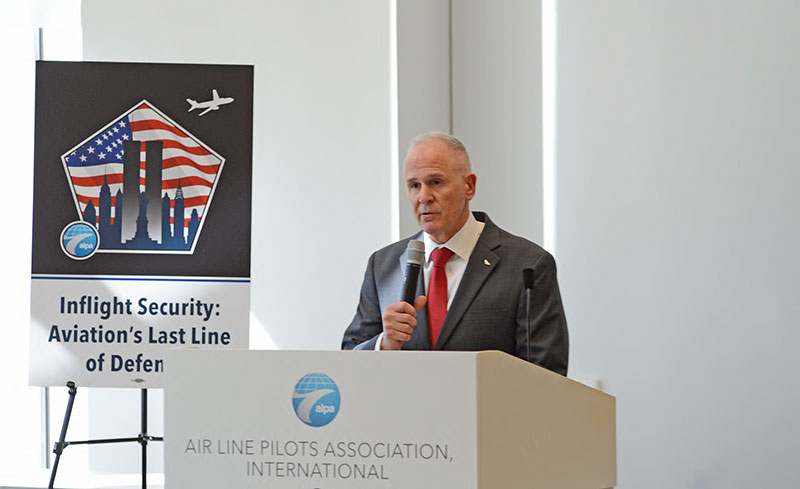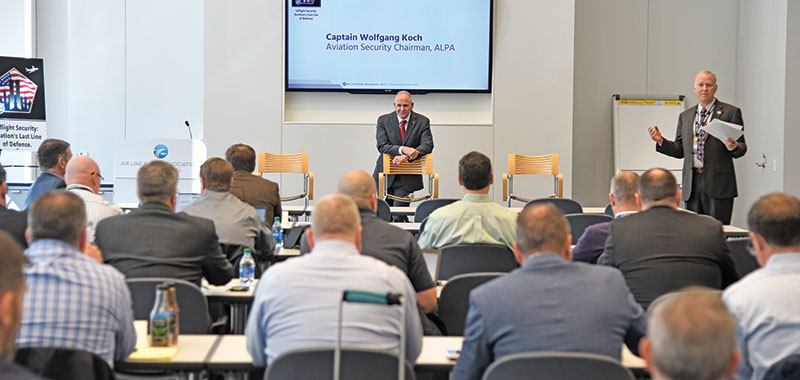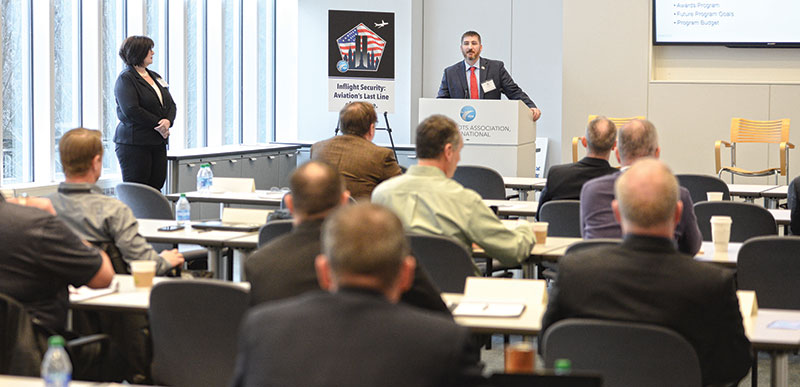Federal Flight Deck Officers: Aviation's Last Line of Defense
By Christopher Freeze, Senior Aviation Technical Writer

Capt. Joe DePete, ALPA’s president, highlights the factors that affect airline security during the Association’s second annual In-flight Security Symposium.
“From the military conflict in Ukraine to the more than 900 reports of unruly passengers on U.S. flights that have already taken place this year means that our in-flight security work can never cease,” said Capt. Joe DePete, ALPA’s president, highlighting the dynamic factors that affect airline security during the Association’s second annual In-flight Security Symposium.
More than 25 ALPA pilots and staff were joined by pilots from other unions on March 2–3 at ALPA’s offices in McLean, Va., to collaborate and discuss the importance of the Transportation Security Administration’s (TSA) Federal Flight Deck Officer (FFDO) program, which emerged in the wake of 9/11 as a vital aviation security enhancement. The symposium highlighted how crucial the FFDO program is to aviation security, enabled discussions among stakeholders, and provided training that continues to support the lifesaving efforts of FFDOs.
Also in attendance were representatives from the FBI, the TSA’s FFDO Program Office, and the Federal Air Marshal Service (FAMS).
“Everyone here recognizes that the FFDO program forms an elemental layer of protection,” DePete remarked. “And since its inception in 2003, the program has evolved to become a proven asset in a data-driven, risk-based approach to aviation security. How? Because of the quality and dedication of the program’s pilot volunteers.”
He stressed that the Association is “pushing Congress for additional funding to support the program in a way that is commensurate with its value to the security of U.S. air transportation—a critical component of the national infrastructure.”
DePete further called on the U.S. government to
- Establish an FFDO Advisory Committee as a federal oversight body for the program, similar to the TSA’s Aviation Security Advisory Committee.
- Allow FFDOs to receive federal tax credits for hours served while acting as an FFDO.
- Mandate that all federal law enforcement training facilities allow FFDOs to attend courses at no cost to the FFDO.
“As everyone attending this summit recognizes, the current global environment leaves air transportation vulnerable to serious threats that must be mitigated,” he remarked. “In this room and across this nation, FFDOs are more than ready to lead a collaborative effort and continue to assume their integral role in securing the skies.”
Both Capt. Wolfgang Koch (Delta), ALPA’s Aviation Security chair, and Capt. Darrin Dorn (Alaska), ALPA’s Aviation Security vice chair, echoed DePete’s sentiments.
Koch reminded attendees, “As security experts, our job is to ensure that we’re ready to prevent another 9/11 event from happening.”

Capt. Wolfgang Koch (Delta), ALPA’s Air Safety Organization Aviation Security chair, reminds attendees that they must remain vigilant to prevent another 9/11 event from happening.
Also speaking at the symposium was Tim Sampson, a TSA field intelligence officer, who reminded attendees of the importance of their role in maintaining aviation security. “The current threat level of civil aviation is high with foreign terrorist organizations likely maintaining the intent and capability to attack using various methods, and they continue to look for new ways to access and attack.
“COVID created the opportunity for groups like ISIS to expand into ungoverned areas to create their caliphate, mostly in Africa,” Sampson continued. “As you can imagine, they’re highly motivated to take action and make a name for themselves—and using aviation to further their objectives.”
Douglas Mohl, an FBI special agent, shared information on the bureau’s airport liaison program, noting, “The FBI’s Civil Aviation Program has 475 special agents and task force officers [TFOs] who came to the FBI from other agencies to support our mission. They have the same database access that we have and can do everything that special agents can do.
“A TFO’s whole job,” he continued, “is to establish relationships with everyone at the airport—from airport and airline operations to airport security and rental car agencies—and listen and share information.”
Mohl also discussed several security programs that the FBI maintains, including Rap Back, which continuously checks aviation badge holders for potential threats.
Kevin Murphy, executive director of the Airport Law Enforcement Agencies Network (ALEAN), provided details about the group, stating, “ALEAN exchanges information between airports and has expanded to include others. We work closely with the TSA and other stakeholders.”
He noted, “In response to an onboard airline threat—after any threat is stopped and if no medical issues or damage to the aircraft are sustained—ALEAN would like to get as much information as possible from the flight crew prior to arriving at the gate. It takes time to investigate, and we know time is the one thing pilots typically don’t have on the ground between flights.”
Thomas Sellers, a FAMS supervisory air marshal in charge, shared the agency’s concept of operations, stating, “We use a risk-based strategy to focus the deployment of our FAMS, but we can only base those deployments on the information provided to us and our team. Firsthand information, like that provided by airline pilots, is some of the most actionable we get, so please make a point to say something if you see something.”
Denise Stark-Jones, the TSA’s Aviation Branch Program manager, and Dan Kuhn, the TSA’s deputy branch manager, provided a breakdown of the COVID-19 pandemic’s impact on the FFDO program and the push to increase the number of FFDOs.
Kuhn also highlighted the recent surpassing of 20 million documented FFDO missions, and provided information about the upcoming “Senior FFDO” program for volunteers who’ve served at least 10 years as an FFDO and have consistently demonstrated adherence to FFDO standard operating procedures.
“While it’s a continuing struggle for the program to maintain consistent funding, the protection FFDOs provide is highly cost effective—just $24.48 per mission flown,” Kuhn acknowledged.

Dan Kuhn, the Transportation Security Administration’s deputy branch manager, discusses the COVID-19 impact on the Federal Flight Deck Officer (FFDO) program and the push to increase the number of FFDOs.
Koi Hallonquist and Matt Ryan, both with FAMS, discussed international agreements and the international In-flight Security Officer Committee, which offers subject-matter expertise on in-flight security programs and support for improving security procedures on board aircraft and after landing by means of postincident procedures.
Jordan Austin, a senior legislative representative in ALPA’s Government Affairs Department, gave his insights from working with lawmakers on Capitol Hill. “The expertise FFDOs provide is really the backbone of our efforts to make those in Congress aware of what you volunteer to do.”
Rep. Jake Ellzey (R-TX), a Southwest Airlines pilot who spoke with attendees via teleconference, shared his support for the FFDO program. “I’ll make my colleagues aware and push for the FFDO program to become bigger, better, and well-funded.”
Symposium attendees also participated in low-light shooting, behavioral detection, and medical kit training at an off-site training facility. There Capt. Bob Fox, ALPA’s first vice president and national safety coordinator, expressed his thanks to the volunteers. “If you took the average salary of a federal air marshal and multiplied that by the number of FFDOs serving today, it would be the rough equivalent of $800 million in service to the nation and industry, which is a tremendous value to the American taxpayer.
“The time you volunteer to train and serve as the final line of defense doesn’t go unnoticed or unappreciated,” Fox noted. “Every pilot and passenger owe you a debt of gratitude for that.”

